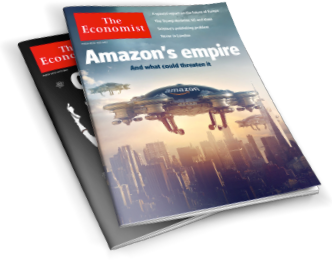A baffling week for competition policy in America
The DoJ is right to oppose the AT&T-Time Warner deal. The FCC is wrong to scrap net neutrality
A day after the DoJ filed its complaint, the Federal Communications Commission (FCC) announced plans to repeal rules which protect “network neutrality”, the principle that internet-service providers (ISPs) must treat all sorts of digital traffic equally. That would enable AT&T and others to charge more for certain types of content, so long as they are open about it. A set of policies that simultaneously thwarts AT&T from bulking up and gives it much greater licence to raise prices, and does both in the name of competition, is incoherent.
Latest updates
Not on their watch
The marriage of AT&T and Time Warner would be a “vertical” merger, meaning that two firms from different bits of the supply chain are combining. The deal would bring together an owner of the infrastructure that distributes content (fixed, satellite and mobile connections) and a firm that creates it. Trustbusters have not looked too closely at vertical deals—and America’s courts have been tolerant of them. The content business is also being disrupted by Amazon and Netflix. That is why Rupert Murdoch is tempted to throw in the towel by selling off bits of 21st Century Fox (see article). AT&T and Time Warner argue they are just legacy firms trying to adapt.Time Warner owns sports rights and many channels, some of which reach nearly all the 100m American households that subscribe to pay-TV. The DoJ worries that the combined firm could exploit this unfairly to win new distribution customers. It thinks it could jack up the fees it charges other video distributors, such as cable and wireless providers; if they balk, subscribers might decamp to its own offerings. This is possible. And there is another worry, particularly as more people consume content seamlessly over mobile devices as well as TVs and computers: that AT&T strong-arms its wireless, satellite and wireline customers to buy more Time Warner content. A vertical merger is dangerous when one of the parties is so powerful. One in two Americans are wireline, satellite or wireless customers of AT&T, which extracts a fat return on capital of 17% (excluding goodwill). A combined firm would be America’s eighth-largest by revenue, with huge lobbying power.
An AT&T-Time Warner tie-up would be even more worrying in light of the FCC’s plans. Ajit Pai, the commission’s newish chairman, thinks that strict rules enforcing network neutrality are not needed. Instead, he wants ISPs to set their own policies and get another agency, the Federal Trade Commission, to enforce them case by case. That might work in countries with fierce competition among fixed broadband providers; in America, where millions of households have only one choice of high-speed supplier, it would surely fail. Big ISPs can charge startups and others more for bandwidth, slowing innovation and leaving consumers with less choice.
America needs to get competition policy right. Concentration has risen across most of its industries over the past two decades. Giants such as Facebook and Google raise profound questions for trustbusters (see article). This week’s signals from the Trump administration could not be more mixed. The DoJ’s more vigorous approach is the right way to go.



No comments:
Post a Comment